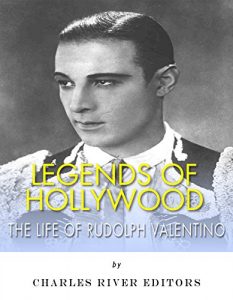*Includes pictures
*Includes a bibliography for further reading
*Includes a table of contents
“A man should control his life. Mine is controlling me.” – Rudolph Valentino
Everything about Rudolph Valentino, from his body to the characters he played, was exotic. His career may have been abbreviated by his premature death at the age of 31, but Valentino popularized the (somewhat racist) stereotype of the “Latin lover” in Hollywood, and even his name was markedly more out of the ordinary than those of other actors. In an era dominated by hyper-masculine actors like Douglas Fairbanks, or comedians such as Charlie Chaplin and Buster Keaton, Valentino had a more ethnic and mysterious appeal, and he was lusted after by women to a degree that remains unsurpassed in the industry. The extent to which he captivated America can be seen in the response to his death; after passing away from a perforated ulcer in 1926, Ashton Trice and Samuel Holland note that his funeral “was one of the pop culture events of the century,” and devastated women are alleged to have committed suicide out of heartbreak.
If Valentino’s public persona was exotic, his personal life and background were no less fantastic, to the extent that it rivaled the improbable narratives of his movies. While he was identified as a Latin American in his films, Rudolph was actually born in Italy, the descendant of French and Italian heritage. The circuitous path that saw him reach the United States, and subsequently the film industry, is replete with outrageous good fortune. Even at an early age, Valentino was a dreamer, but there was no way that he could have anticipated the level of success he would achieve not long after landing in Ellis Island in the winter of 1913.
Rudolph Valentino’s skill as an actor is not always recognized in discussions about the famous star, but his acting style and cultural importance were quite influential. It’s particularly important to take note because Valentino represented a turn toward a masculinity that was softer and, in a sense, more effete than that of his peers. There is no possibility of fully uncovering the mystique of Valentino, but his reputation had a dramatic effect on Hollywood moving forward.
Legends of Hollywood: The Life of Rudolph Valentino examines the life and career of one of Hollywood’s biggest stars of the 1920s. Along with pictures of important people, places, and events, you will learn about Rudolph Valentino like never before, in no time at all.
*Includes a bibliography for further reading
*Includes a table of contents
“A man should control his life. Mine is controlling me.” – Rudolph Valentino
Everything about Rudolph Valentino, from his body to the characters he played, was exotic. His career may have been abbreviated by his premature death at the age of 31, but Valentino popularized the (somewhat racist) stereotype of the “Latin lover” in Hollywood, and even his name was markedly more out of the ordinary than those of other actors. In an era dominated by hyper-masculine actors like Douglas Fairbanks, or comedians such as Charlie Chaplin and Buster Keaton, Valentino had a more ethnic and mysterious appeal, and he was lusted after by women to a degree that remains unsurpassed in the industry. The extent to which he captivated America can be seen in the response to his death; after passing away from a perforated ulcer in 1926, Ashton Trice and Samuel Holland note that his funeral “was one of the pop culture events of the century,” and devastated women are alleged to have committed suicide out of heartbreak.
If Valentino’s public persona was exotic, his personal life and background were no less fantastic, to the extent that it rivaled the improbable narratives of his movies. While he was identified as a Latin American in his films, Rudolph was actually born in Italy, the descendant of French and Italian heritage. The circuitous path that saw him reach the United States, and subsequently the film industry, is replete with outrageous good fortune. Even at an early age, Valentino was a dreamer, but there was no way that he could have anticipated the level of success he would achieve not long after landing in Ellis Island in the winter of 1913.
Rudolph Valentino’s skill as an actor is not always recognized in discussions about the famous star, but his acting style and cultural importance were quite influential. It’s particularly important to take note because Valentino represented a turn toward a masculinity that was softer and, in a sense, more effete than that of his peers. There is no possibility of fully uncovering the mystique of Valentino, but his reputation had a dramatic effect on Hollywood moving forward.
Legends of Hollywood: The Life of Rudolph Valentino examines the life and career of one of Hollywood’s biggest stars of the 1920s. Along with pictures of important people, places, and events, you will learn about Rudolph Valentino like never before, in no time at all.






